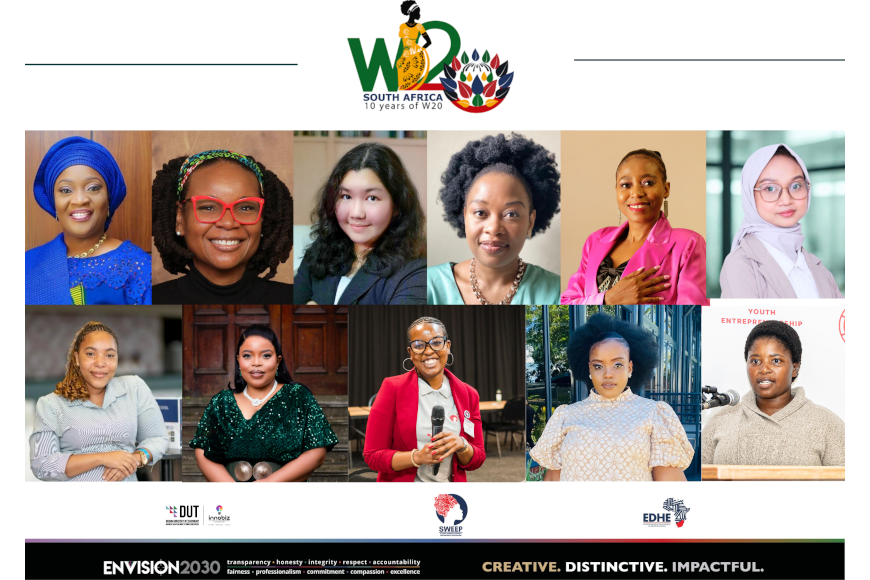In a world increasingly shaped by complex crises and shifting global economies, the voices of young women leaders are no longer whispers at the margins, they are the pulse of transformation. This was powerfully demonstrated during the Durban University of Technology (DUT) recent webinar, “G20 Women Leaders: Inspiring a New Generation,” hosted by the DUT Chapter of the Student Women Economic Empowerment Programme (SWEEP) in alignment with the W20, the official G20 engagement group dedicated to women.
What began as a virtual event quickly evolved into a global dialogue. Student leaders, policymakers, academics, entrepreneurs and seasoned change makers converged to do more than talk as they came to ignite. At its heart, the webinar explored how women, especially young, emerging leaders can be equipped to solve local and global challenges through innovation, education and entrepreneurial action.
Programme Director Sinalenjabulo Ndlovu, alongside SWEEP Chapter executives Nompumelelo Ngcobo, Siyethemba Ngema and Londiwe Gumede, opened the platform with purpose, setting the tone for an afternoon of deeply engaging and often emotional exchanges.
Sindiswa Khuzwayo, SWEEP DUT Chapter Coordinator, delivered a presentation that connected local impact to institutional vision.
“Our work at the SWEEP DUT Chapter in collaboration with innobiz DUT Centre for Entrepreneurship and Innovation and across the university is rooted in these values,” she said, referring to DUT’s ENVISION2030 strategy. “By embedding entrepreneurial support within our Centre and SWEEP introduced by Entrepreneurship Development in Higher Education (EDHE), we’re closing the gender gap in innovation and amplifying the voices of young South African women,” said Khuzwayo.
In the global context, South Africa, like many nations faces a stubborn youth unemployment crisis. And women, especially young women, bear the brunt of it. The W20’s involvement gave the event a powerful diplomatic and policy lens, linking local student initiatives to global action agendas around economic inclusion, digital transformation and gender equity.
Keynote speaker Her Excellency Chief Dr Jewel Howard Taylor, former Vice President of Liberia, brought gravitas and lived wisdom to the conversation. Reflecting on her 30-year journey in politics, she reminded participants that leadership is not inherited but it is earned. “I came from being a Deputy Governor of the Central Bank, becoming First Lady, then elected twice as a senator and finally, Vice President. Each of these roles taught me how women can lead, shape policy and build nations,” she said.
Dr Meredeth Summers, director of USSAVI built on this, bringing both data and deep empathy into the discussion. Drawing from her work in underserved communities, she highlighted the power of education not just as personal advancement, but as a community wide catalyst. “You are not just students. You are economic drivers, innovators, and architects of the future,” she said, urging women to leverage their education as a tool for generational change. Her grandmother’s advice, “Have your own nickels,” became a symbolic anthem for self-sufficiency and resilience.
Among the many voices, DUT lecturer, Dr Thulile Mofokeng’s contribution stood out for its honest confrontation of institutional gaps and persistent stereotypes. “Higher education must evolve from being spaces of regurgitating information to becoming platforms of creativity, innovation and entrepreneurship,” she said. Drawing attention to the damaging myths that label women as “too emotional” or “risk averse,” she called on universities to design more inclusive systems from funding opportunities to curriculum integration to support women led innovation. Articulating DUT’s Deputy Vice-Chancellor: Research, Innovation and Engagement, she reminded the audience that “academic excellence must be redefined and measured not just by publication, but by solving real world problems.”
The webinar also spotlighted rising global youth leaders like Tarantorn “Tara” Kaveeta Nakul, CTO of Why Waste and Dyah Ayu Puspita Ningrum the Vice director of HIPKA, who presented solutions rooted in grassroots community work and tech innovation. From coding clubs for young girls to small local leadership workshops, their message was clear: big change often begins with small access.
“When young women see leaders who look like them, it helps them imagine what’s possible,” said Ningrum.
Zanele Tsambo president of African Women In Leadership urged for more intentional strategies to drive gender equity in Africa’s economic systems, while other speakers emphasised building collaborative ecosystems that include government, business and civil society.
As the dialogue closed, Siyethemba Ngema, SWEEP Executive, gave voice to the spirit of the day: “We’ve shared powerful stories and visions for the future. From political leaders to youth innovators, each speaker showed that when women rise, entire communities rise with us.”
The DUT hosted webinar was more than an academic event, it was a declaration. It affirmed that empowering young women is not a peripheral project, it is the heart of sustainable development. It demonstrated that institutions like DUT, through programmes like SWEEP, are not simply preparing women to participate they are preparing them to lead.
Pictured: Young women leaders speaking at the G20 Women Leaders.
Sindiswa Khuzwayo

